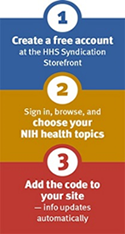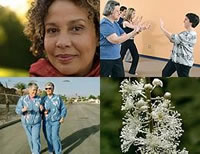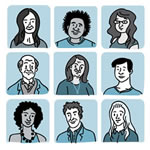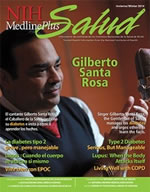FEATURE STORY
Letter from Dr. Stephen I. Katz: The Value of Clear Science Communications
Dear Colleagues:
A key part of the National Institutes of Health (NIH) mission is to communicate research results in ways that scientists and non-scientists alike can understand and appreciate. The NIAMS, like all of the federal government, is committed to using clear language in our communications, regardless of the topic and the target audience. Some people have the misconception that plain language appears unprofessional or is less accurate. On the contrary, it tells your audience exactly what they need to know without using unnecessary scientific or technical jargon. Most of us already do this when talking to patients who may not have the same scientific knowledge as we do or to colleagues outside of our area of expertise.
Image: Stephen I. Katz, M.D., Ph.D.
NEWS AND EVENTS
NIAMS Takes On “Language Access”
The Affordable Care Act has made it possible for millions of people to attain affordable health coverage. However, people with limited English proficiency face a daunting challenge upon entering the health care system—language barriers. According to recent U.S. Census Bureau estimates, nearly 20 percent of the U.S. population—about 55 million people—speak a language other than English at home. The NIH has addressed this challenge by establishing the NIH Language Access Plan, a comprehensive strategy being implemented across the agency to help people with limited English proficiency access NIH programs and activities. The NIAMS is at the forefront of making health information more accessible.
NIMHD Is Now on Facebook and Twitter!
The National Institute on Minority Health and Health Disparities (NIMHD) is now using social media to share critical information and help the public to understand the work they do—striving for all populations to have an equal opportunity to live long, healthy and productive lives. The NIMHD’s social media activity will promote engagement to support the pursuit of innovative research discoveries, training for the next generation and dynamic collaborations and partnerships.
![]() https://www.facebook.com/NIMHD
https://www.facebook.com/NIMHD
![]() @NIMHD (https://twitter.com/NIMHD)
@NIMHD (https://twitter.com/NIMHD)
Events
NIAMS To Host Twitter Chat on Vasculitis
The NIAMS will host a Twitter chat on the topic of vasculitis on Wednesday, May 13, 2015, from 2 p.m. to 3 p.m. EDT. The chat will focus on the various forms of vasculitis, their symptoms and treatments, and current research. Followers will also learn how they can participate in NIH clinical studies. NIAMS experts Peter Grayson, M.D., M.Sc., and Elaine Novakovich, R.N., will answer questions from the audience. Other NIH Institutes and Centers may also participate. To follow the chat, go to https://twitter.com and type #NIHVasculitisChat in the search field.
AHRQ Research Conference Returns in 2015
The Agency for Healthcare Research and Quality’s (AHRQ) research conference is scheduled for October 4–6 at the Crystal Gateway Marriott Hotel and Convention Center in Crystal City, Virginia. The conference will bring together experts in health care research and policy to participate in sessions focused on addressing today’s challenges in improving quality, safety, access and value in health care. Information about submitting abstracts, registration, the conference agenda and more will be coming soon.
2015 NIMHD Translational Health Disparities Course
The NIMHD Translational Health Disparities Course is a 2-week intensive course held August 3–14, 2015, on the NIH campus in Bethesda, Maryland. Focusing on concepts, methods, key issues and applications, the course aims to provide the knowledge and research tools needed to conduct and develop translational and transdisciplinary research and interventions to eliminate health disparities. The application period is now open.
Behavioral and Social Sciences Lectures
The Behavioral and Social Sciences Research Coordinating Committee and the Office of Behavioral and Social Sciences Research regularly convene a series of guest lectures and symposia on selected topics in the behavioral and social sciences. These presentations by prominent behavioral and social scientists provide overviews of current research on topics of scientific and social interest. All seminars are open to the public.
Upcoming Lecture:
Friday, May 8, 2015, 2 to 3 p.m. EDT
Panel Discussion: “Social Inequalities in Health”
Ann Morning, Ph.D., New York University
Dorothy Roberts, J.D., University of Pennsylvania
Jo Phelan, Ph.D., Columbia University
Natcher Conference Center, Balcony B, NIH Campus, Bethesda, Maryland
Video: https://obssr.od.nih.gov/video/bssr_lecture_series/social_inequalities.aspx
NIH Health Disparities Seminar Series
The NIMHD sponsors the monthly NIH Health Disparities Seminar Series. The forum disseminates information on advances, gaps and current issues related to health disparities research. It features national and international health disparities research experts, including many funded by the NIMHD, the other NIH Institutes and Centers and federal agency partners. Each seminar focuses on a specific theme.
FEATURED RESOURCES
May Is National Asian American/Pacific Islander Heritage Month
Being an Asian American or a Pacific Islander means being part of a diverse population with a rich heritage that honors family and community. But it also means you may have an increased risk for health conditions like lactose intolerance, osteoporosis, rheumatoid arthritis or lupus. Staying informed about these and other conditions can help you live an active life.
Get Free Health Content From the NIH for Your Website
The NIH is proud to begin offering its high-quality, trusted web and multimedia content via syndication services, free of charge. If you maintain a website or blog, you can now automatically pull in content from the NIH without changing your own site’s look-and-feel. And best of all, as the NIH changes its content, the pages on your website will automatically be changed in real time, too!
Infographic: How Sex and Gender Influence Health and Disease
The NIH Office of Research on Women’s Health (ORWH) has created an infographic about how sex and gender influence health and disease. It educates about the difference between sex and gender, and also provides examples of sex and gender differences between men and women that are indicative of our different biology and health concerns. Examples include osteoporosis and osteoarthritis of the knee, mental health, smoking cessation and cardiovascular risk. The graphic can be printed as an 11x17-inch poster.
New! Women of Color Health Data Book
Women of color have unique health needs, which are illustrated in a new publication from the ORWH, the Women of Color Health Data Book [PDF - 2.5 MB], 4th Edition. This information collection presents data on race/ethnicity and disease. This data offers clues about how culture, race/ethnicity, socioeconomic background and geographic location contribute to the health status of women of color. In order to explore sex differences, scientists need data about the similarities and differences between women and men in diabetes, cardiovascular disease and other conditions.
Women’s Health and Complementary Approaches
Some health and wellness issues are unique to women, and others are more common in women than men. This page provides resources and information on health conditions of special concern to women, including menopause, pregnancy, arthritis and osteoporosis. It also includes summaries of research on the effects of complementary health approaches in women with a variety of health conditions.
Low-Back Pain and Complementary Approaches
It is estimated that one in four adults in the United States experience low-back pain. For some people, the pain can become chronic and even debilitating. Learn what the science says about complementary health approaches for low-back pain.
Get Free Spanish Information: “Considering Surgery” and “Hospital Hints”
You’ve just come back from a medical appointment. The doctor says you need surgery. What’s more, you’ll need to stay overnight at the hospital. Now what?
Anyone in this situation might feel overwhelmed—but for people who communicate best in Spanish, it can be especially difficult. The National Institute on Aging (NIA) at the NIH can help with its FREE, Spanish-language fact sheets:
¿Está considerando hacerse una cirugía? (Considering Surgery?)—Learn what questions to ask a doctor when thinking about surgery (for example: What does the procedure involve? How long will it take to feel better after surgery?) and ways to plan for the procedure.
Consejos para cuando debe ir al hospital (Hospital Hints)—Get tips on how to prepare for a hospital stay and what to expect while at the hospital.
What’s New in the Knowledge Center
The Knowledge Center at the Office of Minority Health Resource Center maintains a collection of 50,000 documents, reports, books, journals, media and articles related to the health status of racial and ethnic minority populations. The library collection also includes sources of consumer health material in more than 35 languages.
Community Health Worker Toolkit
The Centers for Disease Control and Prevention has compiled a toolkit of evidence-based research that supports the effectiveness of Community Health Workers (CHWs). This resource includes information state health departments can use to train and further build the capacity of their CHWs, as well as helpful resources that CHWs can use within their communities.
New From Coverage to Care Roadmaps Are Available in Chinese, Korean and Vietnamese!
From Coverage to Care is an initiative from the Centers for Medicare & Medicaid Services designed to help people with new health coverage understand their benefits and connect to primary care and the preventive services that are right for them. A Roadmap to Better Care and a Healthier You is now available to download and print in Chinese, Korean and Vietnamese.Other Resources
Other Resources
NIH News in Health
Read practical health information in NIH News in Health, which is reviewed by the NIH’s medical experts and is based on research conducted either by the NIH’s own scientists or by its grantees at universities and medical schools around the country.
Be a Partner in Clinical Research: Help Others, Help Yourself
Whether you’re healthy or sick, young or old, male or female, you’re probably eligible to participate in clinical research. Your participation may help to improve medical care.
Fixing Flawed Body Parts: Engineering New Tissues and Organs
NIH-funded scientists are exploring innovative ways to fix faulty organs and tissues or even grow new ones.
NIH MedlinePlus Salud Magazine
NIH MedlinePlus Salud magazine presents Spanish readers with the best in reliable, up-to-date health information. The magazine includes the latest breakthroughs from NIH-supported research, and features people from all walks of life talking about how they have handled their health challenges. The magazine also is available in English, and subscriptions are free of charge. A recent issue included a NIAMS-supported story on lupus.
- Lupus: Cuando el cuerpo se ataca a sí mismo / Lupus: When the Body Attacks Itself
- Lupus: Síntomas y causas / Lupus: Symptoms & Causes
- Se han hecho avances en el diagnóstico y el tratamiento del lupus / Progress Made in Lupus Diagnosis and Treatment
WHERE IS NIAMS?

The NIAMS exhibit will be traveling to several events in 2015. See the schedule of health fairs and exhibits.
The NIAMS can provide health information or staff to help make your community event or health fair successful. Please contact Sara Rosario Wilson by email, [email protected], for more information.
Image: the NIAMS Exhibit










